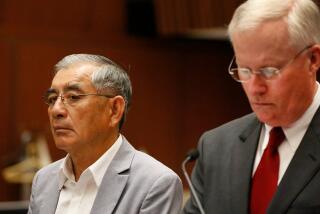Man Cleared of Fraud in Kim Funding Effort
LOS ANGELES — Hyundai controller Paul Koh was found not guilty Thursday of conspiring to illegally contribute corporate money to the 1992 election campaign of Rep. Jay C. Kim (R-Diamond Bar).
Immediately after he was acquitted of charges that could have landed him in federal prison for 10 years, Koh let out a loud moan of relief and hugged his attorneys, Jerome Roth and Bart Williams. His wife, Angie, sobbing with emotion, was removed from the downtown federal courtroom at the request of U.S. District Judge Richard A. Paez.
“I just want to thank God,” an emotional Koh said as he left the courtroom.
Koh was acquitted of conspiring to defraud the United States government by taking part in a plan to funnel $4,500 of Hyundai Motor America money into Kim’s campaign treasury.
Assistant U.S. Atty. Edward B. Moreton Jr. could not be reached for comment.
Juror foreman George Potter, a retired college president, said he believed the government simply didn’t prove its case. “After hearing the jury instructions from the judge, we felt there was not enough hard evidence to convict,” Potter said.
Other jurors agreed, saying they were unwilling to make Koh the fall guy for the scheme to help finance Kim’s election bid. “I didn’t think it was fair he was the only one charged,” juror Monica Marroquin said.
Koh said he was puzzled why he was the only one of five employees implicated in the scheme who was brought to trial. “I really don’t know why I was the one,” he said.
Hyundai has already pleaded guilty to making illegal contributions and paid a $600,000 fine.
Koh’s superiors, including former company President D.O. Chung and Executive Vice President Mark Juhn, both of whom had been granted immunity from prosecution by the United States government, testified during the trial that Koh had nothing to do with formulating the plan.
Chung said he had believed the plan to contribute to Kim’s campaign was not illegal but was developed to slip through what he thought was a loophole in the law that prohibits corporations from contributing to federal elections. The scheme called for five Hyundai employees, including Koh--who had been issued company checks totaling $4,500--to write personal checks in the same amounts to the Kim campaign.
More to Read
Inside the business of entertainment
The Wide Shot brings you news, analysis and insights on everything from streaming wars to production — and what it all means for the future.
You may occasionally receive promotional content from the Los Angeles Times.










